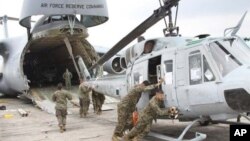A group of Central American and international donors, including the United States, recently held their third meeting to reduce levels of crime and violence in Central America. Since its first meeting in June 2011, there has been significant progress, said U.S. Secretary of State Hillary Clinton. She noted that compared to the first six months of 2011, homicide rates have declined in Guatemala, Honduras, and in El Salvador.
But she also called for more to be done as the rates of violence remain too high. The first step is to double down on efforts to make the region’s police more responsive to the citizens they have sworn to protect. For instance, the United States has funded model police precinct programs in El Salvador and Guatemala. This program provides training and equipment to get local police involved in their communities, to build trust between citizens and law enforcement, and to target the zones of impunity where criminals operate.
Another area of focus should be violence prevention programs that target those who are most vulnerable to being recruited by criminal gangs, namely young people and marginalized populations. The U.S. Agency for International Development, or USAID, is at work in high crime areas in El Salvador, Guatemala, and Honduras, partnering with civil society, municipal leaders, and businesses to provide education and vocational training for these at-risk groups.
It is critical that Central American countries maintain the political will that has driven change from within the governments and societies. Since last year, Honduras has passed a law permitting the extradition of drug traffickers. Costa Rica has strengthened its police forces and courts. Guatemala has ramped up its efforts to seize drugs and arrest criminals at the border with Mexico.
Finally, it is necessary for donor countries, like the United States, to continue to coordinate their efforts in order to further focus resources where they’re needed most. This year the United States will provide 135 million dollars to these efforts, which brings the U.S. total in the past five years to nearly half a billion dollars.
“Based on the evidence,” said Secretary Clinton, “this has been money well spent. We are very proud to be partnering with [Central America], because our partnership is not simply about reducing crimes. It is about building safe and stable communities that will allow entire societies to thrive and prosper.”
But she also called for more to be done as the rates of violence remain too high. The first step is to double down on efforts to make the region’s police more responsive to the citizens they have sworn to protect. For instance, the United States has funded model police precinct programs in El Salvador and Guatemala. This program provides training and equipment to get local police involved in their communities, to build trust between citizens and law enforcement, and to target the zones of impunity where criminals operate.
Another area of focus should be violence prevention programs that target those who are most vulnerable to being recruited by criminal gangs, namely young people and marginalized populations. The U.S. Agency for International Development, or USAID, is at work in high crime areas in El Salvador, Guatemala, and Honduras, partnering with civil society, municipal leaders, and businesses to provide education and vocational training for these at-risk groups.
It is critical that Central American countries maintain the political will that has driven change from within the governments and societies. Since last year, Honduras has passed a law permitting the extradition of drug traffickers. Costa Rica has strengthened its police forces and courts. Guatemala has ramped up its efforts to seize drugs and arrest criminals at the border with Mexico.
Finally, it is necessary for donor countries, like the United States, to continue to coordinate their efforts in order to further focus resources where they’re needed most. This year the United States will provide 135 million dollars to these efforts, which brings the U.S. total in the past five years to nearly half a billion dollars.
“Based on the evidence,” said Secretary Clinton, “this has been money well spent. We are very proud to be partnering with [Central America], because our partnership is not simply about reducing crimes. It is about building safe and stable communities that will allow entire societies to thrive and prosper.”






